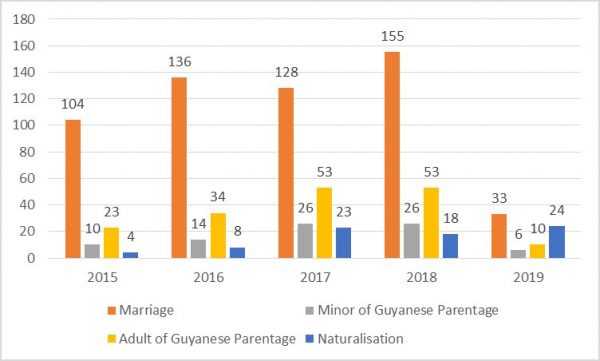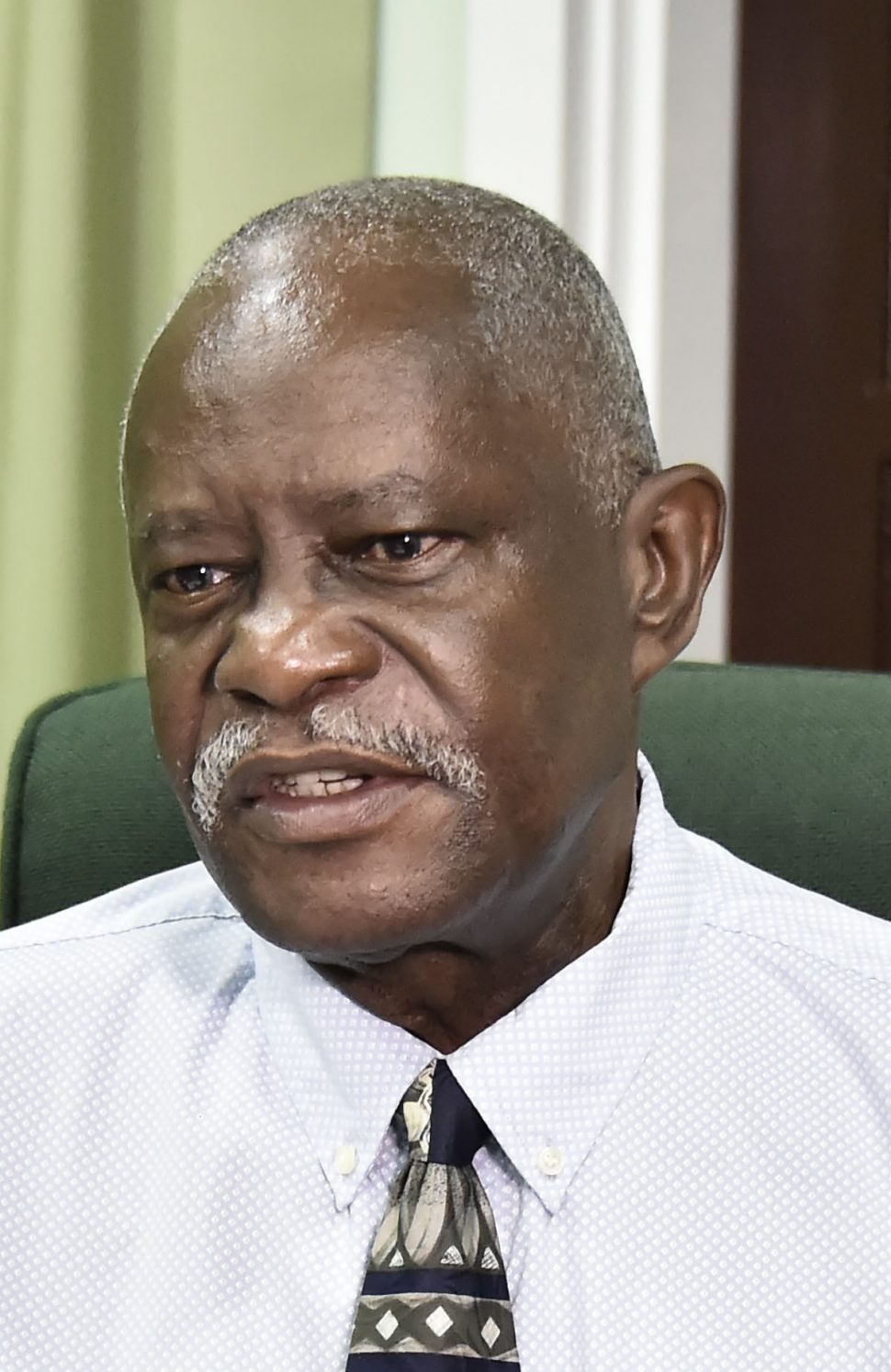While disclosing that just under 900 foreign nationals have been granted Guyanese citizenship since he took office in 2015, Citizenship Minister Winston Felix says the law was followed in each case and he has dismissed the recent claims by the opposition of corruption as unfounded and mischievous.
Felix also questioned the motive behind the “inaccuracies” in a letter penned by opposition Chief Whip Gail Teixeira, whom he said ought to be well aware of the facts, particularly as it relates to naturalisation, given her experience as the country’s security minister under the former PPP/C administration.
On the request of Sunday Stabroek, Felix recently provided data on those persons who were granted Guyanese citizenship between the period, June 2015 and March 2019, including the numbers (888 in total), the grounds upon which they based their applications and their nationalities involved.
According to the information provided and in keeping with what is outlined in the laws of Guyana, and specifically the Guyana Citizenship Act, there are four grounds for registration as a citizen of Guyana: marriage to a Guyanese national; being the minor child born abroad to a Guyanese; being an adult foreign national of Guyanese parentage; and naturalisation. The latter requires residence in Guyana for a specified period of time.
In the case of citizenship by marriage, Felix explained that there is no time qualification for an applicant to seek citizenship. “The law states nothing like that. You get married to a Guyanese today, tomorrow you can apply for citizenship [and] as soon as you get citizenship you can apply for your passport,” he explained.
From June 2015 to March 2019, the annual figures stood at 104, 136, 128, 155 and 33 for those who were granted citizenship based on marriage; for those in the minor category, the figures presented were 10, 14, 26, 26 and 6; for those adult foreign nationals of Guyanese parentage, the figures were 23, 34, 53, 53 and 10; and for those naturalised the figures were 4, 8, 23, 18 and 24.
Persons from a total of 42 nationalities were granted citizenship from June 2015 up to March this year. Most of them were naturalised, having spent the required amount of time living in Guyana.
In 2015, Cubans topped the list of those granted citizenship with 20 successful applicants, followed by Britons at 16, Jamaicans at 15, and Indians at 14.
In 2016, Cubans topped the list again with 23, followed by Indians, 18, Brazilians, 17, Nigerians, 16, Britons, 15, Jamaicans, 12, St. Lucians, 11, and Trinidadians, 10.
According to the figures provided, in 2017 Nigerians topped the list with 43 successful applicants, followed by Americans, 25, Cubans, 19, Brazilians and Jamaicans, with 13 of each, and Indians, 12. In 2018, Cubans topped the list with 44 successful applicants, followed by Nigerians, 35, Brazilians, 19, Indians, Trinidadians, Americans and Venezuelans, with 15 of each, Jamaicans, 12, and Britons, 11. So far for 2019, Nigerians are heading the list with 14, followed by Cubans, 8, and Trinidadians and Brazilians, with 6 each.

Citizens from Bangladesh, Barbados, Kenya, Libya, the Philippines and Zimbabwe have also been granted citizenship.
In responding to questions from this newspaper, Felix said there are three situations which lead to the granting of citizenship after the submission of an application. He made specific reference to Section 4 of the Guyana Citizenship Act, which deals with the `Registration of Certain persons as citizens’ and the Second Schedule which deals with `Qualification for Naturalisation.’ Felix explained that Section 4 (1) covers those persons who come here from the Caribbean, England, Ireland, Scotland and former British territories who are now part of the Commonwealth. “They are entitled to five years of residence and they can apply for registration as a Guyanese,” he explained.
Any person born to Guyanese parents outside of Guyana can apply for citizenship either as a minor or as an adult. “If the child or the parent is seeking Guyanese naturalisation, all they need to do is to satisfy us by a birth certificate that they are Guyanese and that the child was born of their body,” he said.
For the naturalisation category, the Act stipulates the length of time one has to be living in Guyana as well as other requirements which include the publication of naturalisation notices in a newspaper. Prior to the application, the applicant must be resident in Guyana for at least 12 months and in the seven preceding years the applicant must be in Guyana for periods amounting to not less than five years.
Felix said that the opposition failed to note that in all the instances outlined in that section, the minister has “discretionary powers.”
Opposition leader Bharrat Jagdeo recently said that suspicious ads published in the state-owned Guyana Chronicle have raised concerns. He produced ads which he said were discovered during research by a team led by Teixeira, where the same photograph of two applicants appeared on two different occasions but with different names and addresses. The Chronicle later said that these were errors, which resulted from a layout glitch and that these were immediately rectified when brought to its attention.
During the interview with Sunday Stabroek, Felix reiterated that the publication of naturalisation notices is out of his department’s hand. “The Department of Citizenship, has only to inform the persons of the requirements and that, the newspaper publication, is one such. “After they are informed, we have nothing to do with it. They choose which newspaper they want. If the newspaper consistently make errors in the publication, I have nothing to do with that, the Department has nothing to do with that, the staff of the Department has nothing to do with it. What we would to do is when they submit, we’ll make careful note of what is being submitted, bearing in mind what we have seen in the newspapers,” he stressed.
He added that the applicants have to submit a copy of the advertisement and same is placed in a file that is compiled at the Department.
According to the minister, the “bad” experiences of some of the applicants in the Chronicle newspaper “has nothing to do with citizenship. Who are we going to call? It’s not for us to do that.”
Further, he said one of the affected persons visited him last Monday and said that after they saw the incorrect publications, they made contact with the newspaper.
‘Running scared’
Felix was adamant that PPP is “running scared” because it fears that persons seeking citizenship will be mobilised to “lessen their chances” of winning the next general elections.
“We (government) have no such intention,” he insisted, before adding that “Miss Teixeira and company can hold whatever inquiry they want, all of them have satisfied the requirements.”
He said that any applicant coming with incorrect information is dealt with by his staff as he only sees the certificate when it reaches his desk for signature. “There must be some of them, but they don’t reach me because they (the staff) know what to accept. When the entire process is completed and they have satisfied all the requirements, then the papers come to me,” he said.
Felix stressed that there is unnecessary alarm being raised by the PPP to “discredit” Department of Citizenship.
Jagdeo had told the media that the Department is engaged in corruption and condoning a people smuggling racket.
“We believe that the bulk of the people are being smuggled through Guyana and that within the Department of Citizenship, there is an enormous cesspool of corruption. They are part of this people smuggling racket that is going on,” he charged.
Felix, however, dismissed those claims and maintained that he follows the law. “I don’t work unless the constitution and laws support my action,” he said.
“They are cranking up a situation of impropriety in the process here [at the Department)]… given that they will not win the elections,” he said, while stressing that the information being disseminated by the opposition is geared at creating confusion.
Teixeira’s letter
Felix took also issue with a letter from Teixeira that was published in this newspaper on April 11th.
In her letter, she made mention of a case where a non-national was granted a passport shortly after arriving in Guyana.
“In September last year, a non-national entered Guyana and was granted a Guyanese passport with a Guyanese name in the same month they landed even though their maiden and married names are completely different,” she wrote.
Felix, however, said he had no knowledge about this and added that the suspected irregularity should have been reported to him so that he could have dealt with it. “I don’t know the case and I can’t deal with the case in abstract,” he noted.
He said if a person applied for citizenship on the basis of Guyanese parentage, then they can be registered today and get a passport tomorrow. “Once they become legitimately a Guyanese, they have a right to a passport so what she is saying there is just to create a situation that is unfounded, unsupported,” he said, while pointing out that the PPP has never produced facts to him to support the wrongdoing it claims is taking place. “They just generalise and pick on issues, blow them up and then run away from them…all that does is excite people in society, particularly people who are on their side of the political divide. If such a wrongdoing exists, as cited, bring it to attention…so that action can be taken,” he added.
Felix also rejected the claims that the department is running a smuggling racket.
With specific reference to the presence of 5,483 Haitians, which Teixeira raised in her letter, the minister explained that in most cases these people are just “passing through” to get mainly to Cayenne, French Guiana, where the diaspora is. He said that these persons are running from hardships, most of which result from natural disasters in their country. “What they should do is research the Haitian situation and see why they are running out of their country… It’s not politics, it is about storm [and] hurricanes consistently,” he said.
He said Guyana is being “kind” to the Haitians just like the Venezuelans. “They pass through here and they are gone their way,” he stressed.
Based on the figures provided to Sunday Stabroek, a Haitian national was granted citizenship in 2015 and another in 2016, while there were seven in 2017, three in 2018, and two so far for 2019.





